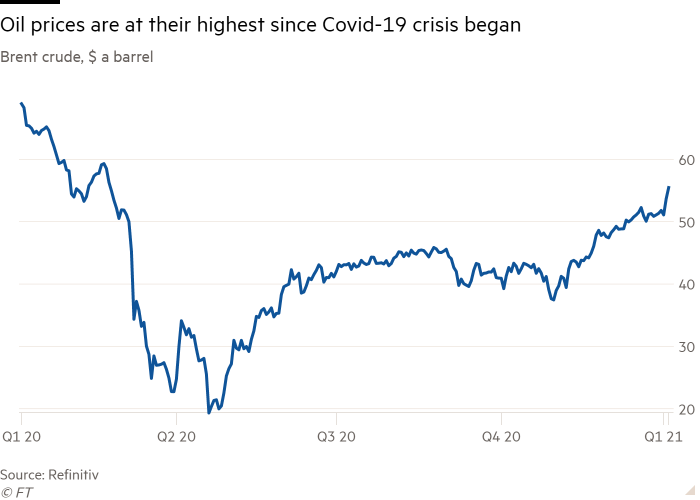Saudi Arabia has pledged to slash an extra 1m barrels a day of oil output in February and March even as Russia moves to increase production, with the kingdom moving to keep the Opec+ group’s fragile alliance intact in the face of the coronavirus pandemic.
At the end of an extended two-day meeting, Saudi Arabia’s oil minister Prince Abdulaziz bin Salman announced the “voluntary” reduction after convincing most countries in the 23-member alliance to hold output steady, fearful of unleashing more barrels on to a crude market still roiled by travel restrictions and lockdowns.
Prince Abdulaziz said the unilateral cut was a “sovereign political decision” by his half brother Crown Prince Mohammed bin Salman, the kingdom’s de facto ruler. It was taken with the purpose of “supporting our economy, the economies of our colleagues in Opec+ countries, to support the industry”, the Saudi oil minister said.
The announcement comes as Saudi Arabia holds a summit for its Gulf neighbours, with Riyadh and its Arab allies agreement to restore ties with Qatar after more than three years of disunity.

Oil prices jumped as much as 5 per cent with Brent crude reaching $53.85 a barrel, the highest level since March, and the US benchmark West Texas Intermediate rising above $50 a barrel as two days of talks between ministers from the Opec+ group reached a finale. The virtual gathering on Monday adjourned with no agreement after a deadlock.
But analysts questioned the motivation behind Saudi Arabia’s move, which would only help rival producers in the US shale patch while giving Russia an allowance to raise its own production.
Since agreeing a record 9.7m b/d production cut in April that curbed almost 10 per cent of global supplies as the pandemic hammered oil demand, Saudi Arabia and Russia — the alliance’s largest producers — had shared equal output targets that had helped to end last year’s shortlived price war.
But from next month Russia together with Kazakhstan, who have asked to raise output as oil prices recover, will increase production by 75,000 b/d in both February and March.
Saudi Arabia’s unexpected supply cuts are likely to be cheered by rival producers, with Russia’s Opec+ representative, deputy prime minister Alexander Novak, describing it as a “great new year present” to the oil industry. International oil companies — from ExxonMobil to BP — saw their shares up as much as 7 per cent after the announcement.
“This ‘surprise’ cut by Saudi Arabia is pure MBS [as Prince Mohammed is known colloquially],” said Greg Priddy, an independent consultant in the oil industry. “It’s a bold move that will let him claim a short-term win on price, but it makes little strategic sense in terms of their long-term position with Russia.”
Bjornar Tonhauge at Rystad Energy said it was “difficult to see how a beast of a 1m b/d cut is justified” at a time when the group was originally supposed to be slowly adding oil back to the market.
“The Saudi move, if realised, is not only offering a soft pillow to the oil market, but also a full set of blankets, bed covers and most likely the bed itself,” Mr Tonhauge said. “But it is quite difficult to swallow the added curtailment size. It’s just too good to be true.”
Saudi Arabia’s cut could also signal persistent concerns about the precarious nature of the oil market’s rebound. Although parts of the world are opening up again, other countries are facing the pressures of a new variant of the coronavirus that is forcing them to reimpose restrictions.
Opec said in a statement that “growing uncertainties have resulted in a more fragile economic recovery”.
Prince Abdulaziz said he hoped Saudi Arabia’s gesture of “goodwill” would ensure others complied with their share of cuts.
One person familiar with the Saudi decision said the kingdom wished to make a hefty cut to production in a bid to boost the market, while taking a “pre-emptive” approach given the sheer level of uncertainty about the trajectory of the virus. It was also about “maintaining solidarity” within the wider group of Opec+ nations.
Countries had already started adding oil back into the market before Opec+ agreed last month to increase production by a further 500,000 b/d in January.
This week Moscow had called for increasing production collectively by another 500,000 b/d in February, while Riyadh and Opec peers pushed for maintaining January’s levels for longer, before the late reveal of new cuts.
https://news.google.com/__i/rss/rd/articles/CBMiP2h0dHBzOi8vd3d3LmZ0LmNvbS9jb250ZW50L2M1NDY4OTI0LTUzODMtNDcxNy04MWM4LTVkMDY1ODc0OGYzMdIBP2h0dHBzOi8vYW1wLmZ0LmNvbS9jb250ZW50L2M1NDY4OTI0LTUzODMtNDcxNy04MWM4LTVkMDY1ODc0OGYzMQ?oc=5
2021-01-05 22:36:00Z
52781278285168
Tidak ada komentar:
Posting Komentar